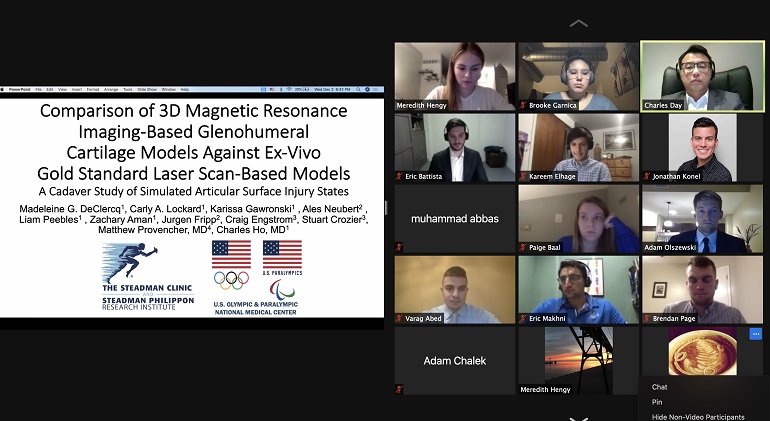
A trio of medical students from the Class of 2023 at the Wayne State University School of Medicine co-hosted the Orthopedic Surgery Interest Group’s second annual Clinical Research Showcase last month, providing 60 students the opportunity to talk about their projects in a virtual setting.
“Student-run showcases are incredibly important to the development of medical students who are looking to get involved in research and research conferences but feel as though they don't have enough experience, or have a fear of presenting, and it's a shame that they’re so rare,” said co-host and OSIG Co-President Kareem Elhage. “Symposiums like this provide students with an opportunity where they can practice their presentations in a low-stress environment while still getting feedback from students as well as very experienced faculty. Fostering similar learning environments is quintessential to increasing medical student involvement in research and academia.”
The three-hour evening event was held Dec. 2, with students showcasing 15 five-minute oral presentations and 45 posters.
The event was held on Zoom, giving students the unique opportunity to present in a virtual setting.
“It challenged my team and the participating students to be flexible and more creative in their presentations to better showcase their work. Often when speaking over phone or via messages, it is difficult to express what you truly mean,” said Brook Garnica, another co-host and OSIG co-president. “Being challenged to come out of our shells and be more creative in our presentations will only help us in our future as physicians. Not every patient is going to be the same and the more we can practice being flexible will better suit us to be the best we can for our future patients.”
The physicians-in-training will be expected to educate patients and sometimes peers and trainees, added co-host Adam Olszewski. “Therefore, developing written and verbal communication skills should be an important part of medical education. In the context of research, it is essential to not only be able to conduct a research experiment, but to also effectively convey the experiment and findings to an audience,” he said.
Presenters were eligible for awards in both categories. Students initially voted for the top three posters, with winners announced at the start of the program. Then, keynote speaker Charles Day, M.D., an orthopedic surgeon at Henry Ford Hospital, spoke on diversity in orthopedics. Dr. Day, along with colleague Eric Makhni, M.D., judged the oral presentations, with winners presented at the end of the event.
“For those who did not present, this was a great learning experience for directly observing the process of research presentation and provided great examples of how the research process is conducted and completed,” said OSIG coordinator Eric Battista. “I think it is incredibly important for medical schools to continue to offer similar opportunities to not only promote professional development but to also encourage medical students to feel comfortable sharing the hard work they put into their research. These shared experiences related to the challenging endeavor of research helps build an inclusive and supportive culture among students.”